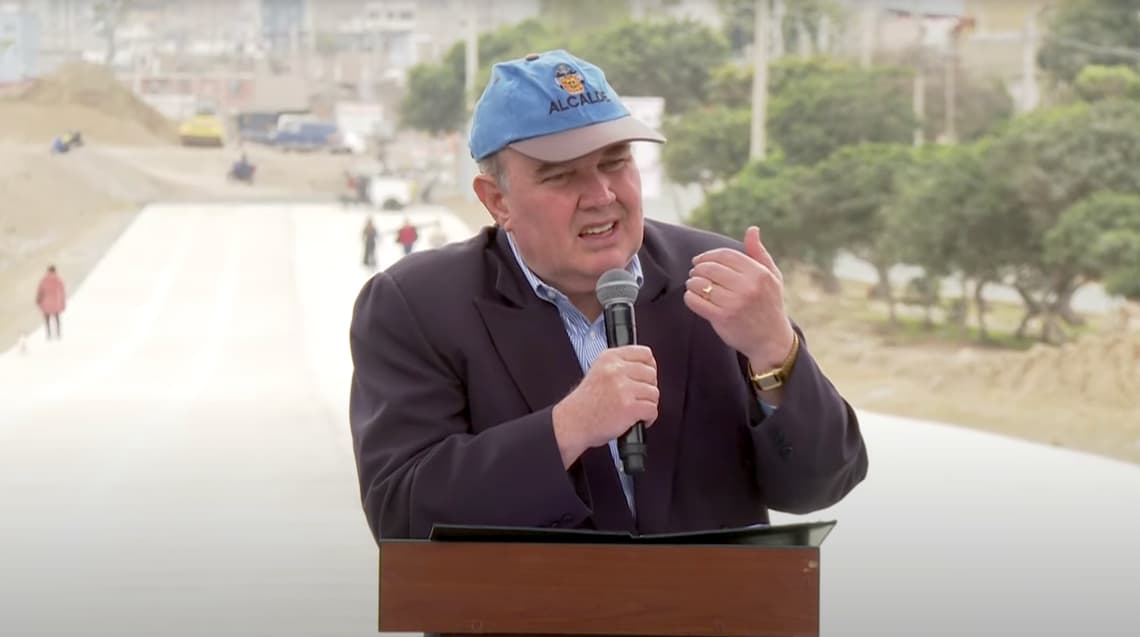ROME – In what has been dubbed an unprecedented move, last week Lima mayor Rafael Lopez Aliaga at the last minute was denied front-row tickets to a papal audience, and the photo with the pope that came with it.
Aliaga, mayor of Lima since 2023, is also leader of the conservative Popular Renewal party and is a candidate in Peru’s presidential and congressional elections, to be held April 12.
He was present in Rome last week and, according to sources with knowledge of the situation, initially asked to have a private audience with the pope, for which he would be accompanied by Javier Cipriani, brother of Cardinal Juan Luis Cipriani, who was punished by Pope Francis over allegations that he sexually abused a minor in confession.
The private audience was denied, however, Aliaga was given special baciamano tickets, meaning front-row tickets which come with a papal photo and handshake, for Leo XIV’s Sept. 17 public general audience.
News of Aliaga’s visit to Rome and his front-row tickets caused widespread backlash among victims of clerical abuse due to his association with a Peru-based lay group suppressed by Pope Francis, the Sodalitium Christianae Vitae (SCV), as well as the presence of Cardinal Cipriani’s brother.
Victims wrote to several Vatican officials, as well as the pope, to voice their concerns.
Critics also took issue over the fact that Aliaga, who is a presidential candidate in Peru’s upcoming general election, would get a photo op that could be manipulated for political ends, as well as recent comments he made saying a journalist should be killed.
In the wake of the backlash, the status of Aliaga’s tickets were changed at the last minute, and instead of getting the baciamano tickets, when he picked up his envelope he had been given reparto speciale, which is still on the main platform, but not in the front row, and therefore meant he would not be meeting the pope.
Aliaga ultimately did not attend the audience, arguing that the change in his ticket status was the result of a maneuver on the part of his political enemies, rather than a bid to preserve Vatican neutrality in an election year.
To change a politician’s ticket status after being guaranteed front-row seats is extremely rare, if not unprecedented, and demonstrates the complexities that surround the church-state relationship in Peru, especially with a pope who holds Peruvian citizenship and is therefore eligible to vote in Peru’s elections.
In the past Aliaga has been open about his friendship and admiration of former SCV-member Father Jaime Baertl, who was expelled from the group prior to its suppression over allegations of financial corruption and sexual abuse, and who is widely considered to be the mastermind of the SCV’s money-making scheme, which as come under scrutiny for alleged tax fraud and international money-laundering.
Among other things, the SCV has been accused of tax fraud by designating nine large cemeteries in Peru as tax-exempt mission territories managed by the SCV-run Saint John the Baptist Civil Association (ACSJB) and sending the many millions of dollars in profits to holding companies abroad.
With the Vatican pressuring the now extinct SCV to turn over significant funds for the reparation of its victims, the ACSJB, according to Peruvian investigative journalist Paola Ugaz, has transferred the money in trust to an investment firm run by Aliaga, Acres Sociedad Titulizadora S.A.
In a letter addressed to Pope Leo ahead of Aliaga’s visit to the Vatican, José Enrique Escardó, the first person to denounce abuses within the SCV and president of the Survivors Network of Peru, lamented that the mayor had publicly manifested support for the SCV and accused members such as Baertl.
“Further, it is commonly known that he does business with them,” he said, specifically mentioning the Acres investment company founded by Aliaga, which he said holds 36 businesses that either belong or used to belong to the SCV.
Escardó said that Aliaga for years attacked victims and survivors, politicians, journalists, and other investigators of the SCV in the media and on social networks in an effort to discredit their claims.
Aliaga and his inner circle, he said, “are responsible for the smear campaigns against those of us who have denounced the Sodalitium’s abuses, as well as the judicial persecution of journalists who have investigated them.”
“We ask that you continue your policy of not accepting the mistreatment of victims of ecclesial violence and your defense of the press that denounces it, and that you not receive this person, who has become one of the Sodalitium’s main political facilitators and one of the main attackers of victims and survivors,” he said.
Victims also criticized Aliaga’s apparent intention to bring Javier Cipriani with him to the papal audience, given the controversy surrounding the allegations against his brother, Cardinal Juan Luis Cipriani, whose ministry was restricted by Pope Francis in 2019 over allegations of abuse, and who caused uproar ahead of this year’s conclave for disregarding those restrictions and participating in the pre-conclave meetings anyway.
RELATED: Cardinals discuss abuse while prelate sanctioned for it joins meetings
Aliaga also faced criticism for comments made during a public speech earlier this month, saying journalist Gustavo Gorriti, president of the IDL Reporteros, a group of investigative journalists, be gotten rid of “for good,” which was interpreted by man as a death threat.
In response, the President of the National Association of Journalists in Peru said the remark amounted to “an act to incite violence” and said it ought to be condemned.
Similarly, the National Association of Journalists in Peru (ANP) also wrote letters to Pope Leo, to Vatican Secretary of State Cardinal Pietro Parolin, and to Italian Sister Simona Brambilla, head of the Vatican’s dicastery for Religious, asking that the pope be protected from the “obvious failure” to properly vet Aliaga before granting him the tickets.
Follow Elise Ann Allen on X: @eliseannallen












